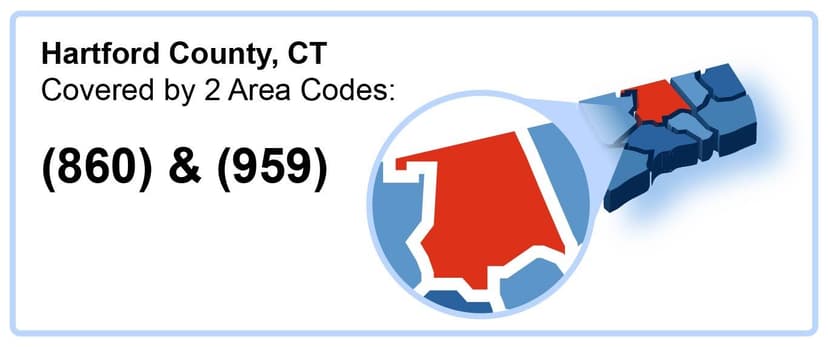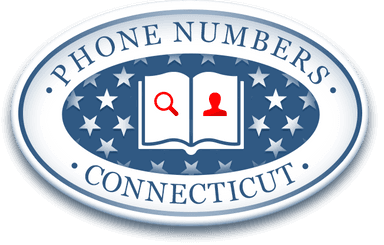What are Hartford County Area Codes?

Hartford County area codes are the strings of three-digit numbers that identify the Numbering Plan Areas (NPAs) within the county. Area codes were designated by the North American Numbering Plan (NANP) and represented by the first three numerals in telephone numbers. The Connecticut Public Utilities Regulatory Authority (PURA) oversees area code administration in the state, including Hartford County codes.
The two active Hartford County area codes are:
Area Code 860
Created in 1995, area code 860 is a Connecticut telephone code covering Hartford County and some parts of neighboring counties. It is a numbering plan area split from the 203 area code. Hartford County locations served by the 860 area code include Bristol, Hartford, East Hartford, West Hartford, and Wethersfield.
Area Code 959
Area code 959 was put in service in 2014 as an overlay for the 860 NPA. Residents must dial all ten digits in the 860/959 overlay when making telephone calls. This area code serves the same communities covered by the 860 NPA.
What are the Best Cell Phone Plans in Hartford County?
A larger population of Hartford County relies on wireless telecommunication services. According to a 2018 CDC survey, a vast number of Connecticuters had adopted cell phones as their sole means of accessing telecommunication services. The report estimated the number of adult Connecticuters who had adopted wireless-only communication services amounted to 40.8%. There were only 6.6% of them who still used only land phones to communicate. Likewise, 50.6% of the minors used cell phones, while 2.3% used landline-only services. The survey report suggests that cell phones are the future of telecommunications.
Voice over Internet Protocol (VoIP) services offer numerous telephone services to Hartford County residents at affordable rates. The service delivers text messages, voice, and video calls to subscribers using IP networks, typically the internet. Access to reliable broadband services has contributed to the uptick in the adoption of VoIP by Hartford County residents for business and home use.
The major phone carriers - AT&T, Verizon, Sprint, and T-Mobile- offer excellent network services in Hartford County. However, their service strength varies by location in the county. In the City of Hartford, Verizon provides the best coverage at 92%, while T-Mobile covers 90%. AT&T has 84% coverage of Hartford, while Sprint offers the least coverage at 76%.
What are Hartford County Phone Scams?
Hartford County's phone scams are frauds perpetrated using telephones to obtain valuable information and money from unsuspecting residents. Scammers employ different schemes to deceive county residents into revealing sensitive information and sending them money. Reverse phone search applications can return information on the identities of persons behind suspicious phone numbers.
The Connecticut State Department of Consumer Protection (DCP) and the Connecticut Office of the Attorney General (COAG) are the key consumer protection agencies in the state. They are responsible for educating residents on how to avoid scams. Both agencies often issue scam alerts to warn residents about the latest ploys adopted by phone scammers and how to identify them. Victims of phone scams in Hartford County can file complaints with both the DCP and COAG. Alternatively, they can file scam reports with the Federal Trade Commission (FTC).
Widespread phone scams in Hartford County include:
What are Social Security Number Suspension Scams?
Hartford County residents should be aware that the employees of the Social Security Administration (SSA) do not threaten people to obtain money or information. Be wary of SSA employees that call and claim that your social security account has been suspended; they are out to steal your personal information. These scammers promise to help their victims resolve the suspension issues and will request the targets' identity and financial information to do this.
Providing these details grants the scammers access to your accounts enabling them to steal their victims’ money and identities. The SSA urges residents not to disclose sensitive information to unknown persons on unsolicited phone calls. If you suspect a scammer has contacted you in this manner, you can verify their claims by calling the SSA on 1 (800) 772-1213. Hartford County residents who think they may have fallen for social security number scams can file their complaints with the OIG, SSA.
What are FBI Phone Scams?
In this type of fraud, scammers call and introduce themselves as representatives of the Criminal Investigative Division of the FBI. They inform their targets that their identities were implicated in on-going criminal investigations. They suspect the identities were stolen but claim their targets are still liable and will be arrested. The scammers will then offer their targets the option of paying to clear their names and close the investigations against them.
Unfortunately, there are victims in Hartford County who have lost thousands of dollars to scammers running such cons. Hartford County residents must know that such calls are bogus. The FBI never calls residents to threaten arrest, request sensitive information, or ask for money. Hartford County residents who receive telephone calls from persons purporting to be from the FBI should hang up and verify the callers’ claims from the FBI in New Haven. Their office can be reached by calling (203) 777-6311.
What are IRS Impersonation Scams?
If you receive an unexpected phone call from the Internal Revenue Service (IRS), end the call and then use a reverse phone number lookup to identify who called. The IRS will contact you by mail before reaching you on the phone if there is any reason to do so. IRS phone scam is one of the scams in Hartford County that has caused many taxpayers significant losses. Scammers pose as IRS agents and claim that you have back taxes and must pay immediately. Their approach is typically aggressive and they want payments wired or made with prepaid cards. They threaten their targets with arrests and jail if they fail to pay promptly.
Do not disclose your personal information or pay money if you get a phone call from someone who claims to work for the IRS. Hang up and verify your tax status by calling the IRS at 1 (800) 829-1040. Residents who are sure of not owing taxes can report these calls to the Treasury Inspector General for Tax Administration. Anyone who falls victim to IRS impersonation scam can file a complaint with the FTC or call 1 (888) 382-1222.
What are False Arrest Scams?
False arrest scams usually target senior citizens in Harford County. Scammers impersonate employees of the Hartford Police Department (HPD) when engaging in false arrest scams. They call targets and inform them that their relatives were arrested and need money to bond out of jail. In some cases, scammers will spoof caller IDs to show HPD's phone numbers. They will tell their targets to send the bond money by wire transfer or gift cards.
The Hartford Police Department informs residents that the only way to post bonds for detainees is at the police stations. If you think you may have fallen for a false arrest scam in Hartford County, report to the HPD by calling (860) 757-4000. Victims may also report false arrest scam incidents by filing complaints with the Connecticut Office of the Attorney General.
What are Robocalls and Spam Calls?
Robocalls are telephone calls made with auto-dialers to deliver pre-recorded messages to mass audiences. Government agencies use robocalls for disseminating information to residents during emergencies. Likewise, legitimate companies employ robocalls for engaging their clients. Robocalls are usually unsolicited and can be inundating. A phone number lookup application can be used to ascertain if a phone call from an unknown number is a robocall or not.
To avoid robocall scams, consider the following actions:
- Do not push any button on your phone, as may be advised during the call. Robocalls will sometimes ask you to dial 1 to remove yourself from their call lists. Doing this indicates that the number is active and this will earn you repeated calls. Hang up immediately you identify a robocall.
- Register your phone number on the Do Not Call Registry to stop receiving unsolicited phone calls from telemarketers. You can do this by dialing 1 (888) 382-1222 from the number you wish to register.
- Use the call-blocking service provided by your phone carrier to block robocall numbers. Phone manufacturers also include call-blocking features in their devices that you can use to prevent spam calls. Third-party developers offer phone number lookup free services that you can use to identify and screen incoming robocalls.
- Report unwanted calls online to FTC or call 1 (888) 382-1222.
How Can You Spot and Report Hartford County Phone Scams?
Phone scammers inundate Hartford County residents with scam calls to steal their money and personal information. Phone scams have become more infuriating as perpetrators develop newer schemes to cheat residents of their money. Residents must stay updated with information regarding phone scams and always remember they are potential targets to avoid falling victim.
Hartford County residents can spot scammers if they watch for particular signs when receiving phone calls from suspicious phone numbers. These signs include:
- Callers pretending to be government agencies’ employees and requesting personal information already in the agencies' databases. Government agencies do not do this on unsolicited phone calls.
- Someone who claims to work for the police department threatening you with arrest if you do not pay or provide confidential information. Legitimate law enforcement agencies do not intimidate residents or request personal information on unsolicited phone calls.
- A caller pretending to be a government agency employee or representative of a reputable organization and requesting payment by money transfers and prepaid cards. Scammers favor these quick payment channels because funds sent through them are harder to trace and reverse.
- Be cautious if you are unduly pressured into paying for a limited-time offer. You may be dealing with a phone scammer.
- If the caller asks you to pay before receiving a prize they claim you won in a lottery or sweepstakes, hang up the phone. It is a ploy to steal your money.
Residents who perform suspicious phone number lookups on unknown caller IDs will have success in avoiding phone scams. Also, having information on the current phone scams can prevent Hartford County residents from falling prey to phone scammers. Some government agencies responsible for educating residents also provide reporting platforms for residents who have fallen victim to phone scams. They include:
The Connecticut State Department of Consumer Protection - The DCP protects residents from deceptive business practices while providing mediums for reporting phone scams. Hartford County residents who have reasons to believe they are victims of phone scams can file complaints online with the DCP. They can also report such incidents by calling the DCP on (860) 713-6300 or via email.
Connecticut Office of the Attorney General - The Attorney General's Office educates residents with scam alerts and suggests guides to avoid phone scams. It also provides informal mediation for residents who fall for phone scammers. The complaint form of the COAG can be used to file reports of phone scams.
Federal Trade Commission - The FTC recommends that the best way to avoid phone scams is refusing to answer calls from phone numbers you do not recognize. The FTC's managed DNC Registry allows residents to opt out of receiving telemarketers' unsolicited calls. This can checkmate robocall scams. Hartford County residents who have been defrauded by phone scammers can register their complaints online with the FTC or call 1 (888) 382-1222.
Hartford Police Department - The HPD is the largest municipal law enforcement agency in the county. Its principal responsibilities are ensuring residents' safety and investigating crimes, including phone scams. Phone scams victims in Hartford County can file their complaints with the HPD by calling (860) 757-4030 or online.
